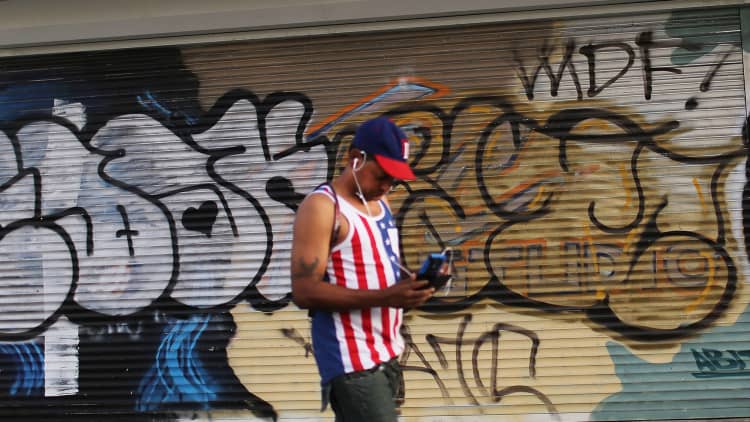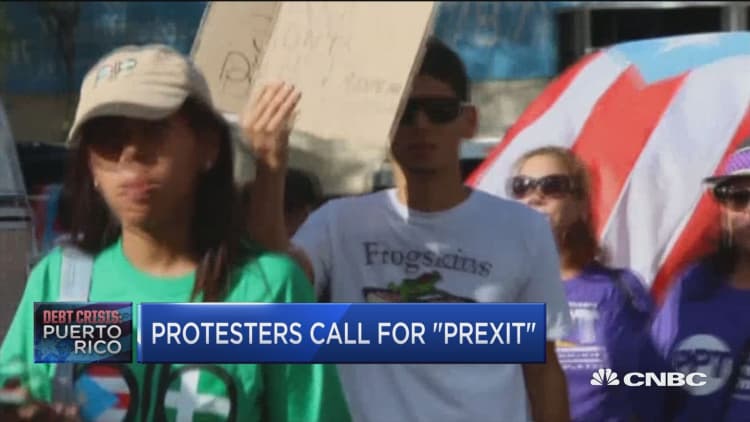
The cash-strapped island of Puerto Rico was hit with several lawsuits on Tuesday just hours after a stay on litigation expired as the commonwealth failed to reach a restructuring agreement with its bondholders on its massive debt load.
In a suit filed by Ambac, one of the largest insurers of debt issued by Puerto Rico, the company argued that "the Commonwealth, egged on by the Oversight Board, continues to flagrantly disregard the rule of law" and is seeking a declaratory judgment that the commonwealth's fiscal plan is unconstitutional and illegal.
Ambac is also seeking to block Puerto Rico from officially launching Title III, a court-supervised bankruptcy-like restructuring process. The restructuring of Puerto Rico's roughly $70 billion in outstanding debt would be the largest in the history of the U.S. municipal bond market.
In a note issued Tuesday, BTIG analysts Mark Palmer and Giuliano Bologna said they believe Ambac's "lawsuits represent the beginning of the municipal bond insurers' pushback against Puerto Rico's efforts to force its creditors to accept severe haircuts, and we would not be surprised to see similar litigation filed by Assured Guaranty and MBIA in the coming days."
MBIA's spokesman said, "The company has no comment regarding potential prospective legal proceedings, if any." A lawsuit filed in June 2016 by National Public Finance Guarantee Corp., a wholly owned subsidiary of MBIA, against Puerto Rico will now be able to proceed, since the stay has expired.
It was put in place in order to allow for negotiations between Puerto Rico and its bondholders as mandated by The Puerto Rico Oversight, Management, and Economic Stability Act, or PROMESA, which was enacted into law on June 30, 2016. That was a day before the island defaulted on nearly $1 billion of principal and interest owed to its creditors — including holders of the island's general obligation bonds, which carry a constitutional guarantee on payment.
Assured Guaranty declined to comment.
Ambac, which backs a large variety of Puerto Rico-issued debt across numerous structures, also filed a suit challenging Puerto Rico's clawbacks of revenue pledged to Puerto Rico Infrastructure Financing Authority rum bonds, which has resulted in multiple payment defaults and "forced Ambac to pay tens of millions of dollars" in claims covering bondholders' losses to date.
Through Dec. 31, Ambac has paid out $63.3 million to holders of various Puerto Rico-issued securities that the monoline insures due to the island's multiple defaults, according to regulatory filings.

A separate lawsuit brought by the senior bondholders of $16 billion of debt backed by sales tax revenues, or COFINA bondholders, argued that Puerto Rico's plan to cut its total debt violates the constitution. It also accused the island's government of partaking in an ongoing campaign to suppress the value of COFINA bonds in an effort to strong-arm the creditors into a renegotiation of their debt on "terms unfairly, unjustifiably, and illegally punitive."
The lawsuits filed Tuesday could be the tipping point for the government of Puerto Rico and its seven-member oversight board — which was also put in place by PROMESA and tasked with overseeing the daunting challenge of restructuring the island's debt — to officially push the island into a Title III proceeding, which could force creditors to accept unfavorable repayment terms.
In a statement released late Monday evening, Puerto Rico's fiscal agency signaled that despite the stay expiring, it wasn't going to rush into Title III.
"The Government is still engaged in meaningful conversations with certain bondholders and creditor groups and is hopeful that it will achieve constructive results from these talks even after the conclusion of the mediation and the expiration of the PROMESA stay."
Title III would also put an automatic stay back in place, protecting the U.S. territory from further lawsuits.

